Students in Mount Sinai are expected to grow up a little faster than those in other districts. While a majority of neighboring towns keep their fifth-graders in the elementary school, Mount Sinai, since the early 1990s, moves its 10- and 11-year-olds up to the middle school.
A mother challenged the concept during an Aug. 23 board of education meeting when she asked administrators to consider making fifth grade part of the elementary school again in the future.
The conversation has been ongoing ever since.
Renee Massari, a mother of two elementary school students, proposed the idea last month, saying she didn’t see the academic or social benefit of having fifth-graders learn under the same roof as eighth-graders. In fact, she believed the drastically different environment negatively affected the young students — who occupy their own wing on the second floor of the building.
“I’ve seen it through many of my friends’ children here — many of them don’t excel.”
—Renee Massari
“I’ve seen it through many of my friends’ children here — many of them don’t excel,” Massari said during the meeting. “It’s almost like they feel deflated because it’s difficult for them to handle those responsibilities expected of our fifth-graders. Because [realistically], they aren’t middle schoolers.”
Massari explained to the board that, from her understanding, the fifth-graders’ premature graduation to the middle school was prompted solely by a lack of classroom space in the elementary school. She asked if an administrator could evaluate current classroom space, adding the school has seen a declining enrollment rate over the last few years.
“Ideally, I would love for the fifth-graders in this district to have the same transition that 99 percent of the districts on Long Island have,” Massari said. “We can house them in the elementary school, a building they’re familiar with, and keep the same program where they transition from classroom to classroom and get them exposed to that before going to a whole different building.”
Board Trustee Robert Sweeney agreed with Massari and said the decision decades ago to move the students into the next building had nothing to do with education and everything to do with space and misjudgment. He also urged the board to reevaluate the concept.
“It’s a fallacy to have elementary students up there,” Sweeney said. “I think we have to look at it because there’s no educational benefit [to it].”
Superintendent Gordon Brosdal, an admittedly “old school guy” who said he would even like to see the sixth grade in the elementary school, told Massari her proposal would be explored — but classroom space, or lack thereof, in the district’s smallest building remains an issue. He said it will take a lot more than one available classroom to bring back the fifth-graders to the elementary school and expansions on the building would be costly.
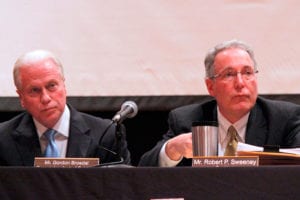
“But in the meantime, what we have to do is make sure the nurturing environment continues in the fifth grade,” Brosdal said.
Teachers, he said, know to treat their students with the same level of care and support elementary school students experience. And although the move up offers a completely new setting, with lockers and classroom changes and multiple teachers during the day, Brosdal sees it as a good transition opportunity.
“Plus, they’re kind of isolated and not mixing with the older grades when they don’t have to,” he said. “At the same time, I understand parents feel their kids are not ready to move up because of maturity and a lot of other reasons, and want them to remain in a nurturing environment.”
In the weeks following the meeting, Brosdal reached out to elementary school principal Rob Catlin, and together they projected six classrooms would be needed in the building to accommodate the roughly 175 students in the current fifth-grade class.
One would be hard-pressed to find three available classrooms, according to Catlin, who is currently in the process of meeting with parents about the issue.
“I’ve heard the same concerns from a couple different people now and I’m reaching out to some parents for some meetings to talk about it,” Catlin said. “As the year goes on, and if the topic continues, I’m more than happy to keep talking. But it’s in an early stage right now.”
Mount Sinai resident Beth Erdmann, whose children are in seventh and 10th grades, said every parent experiences panic in the midst of the elementary and middle school transition but soon realize it’s not a big deal.
“I’ve heard the same concerns from a couple different people now and I’m reaching out to some parents for some meetings to talk about it.”
—Rob Catlin
“When it’s your first child, it seems too soon and scary, but they are in their own wing and it’s a nonissue,” Erdmann said. “There were no adverse effects to my children … fifth and sixth grade are still treated as elementary. The location is just in the middle school. I was worried and bothered at the time, [but] my kids were fine.”
Debra Wesolowski agreed, having gone through the transition multiple times with four children.
“Once they were there, I couldn’t imagine them in the elementary school,” Wesolowski said. “Kids are a lot more mature now than years ago … you see how mature and responsible the fourth-graders become as the year goes on [and] by the time they graduate from fourth grade they have outgrown the elementary school and need to advance to the next stage. The middle school does a great job transitioning them.”
But Jennifer Ruger Lazarou, an elementary school teacher, feels the kids are too young.
“I think keeping them in the elementary school one more year is a good idea, and will still make them just as prepared,” Lazarou said. “I teach in a K-through-six building and can’t even imagine the sixth-graders being exposed to middle school any earlier.”
Brosdal said district office and building administrators have begun the exploration of a move.
“It is too early in the process for the board to make a decision one way or another,” Brosdal said. “The expense of such a project would impact the district’s budget and bond proposal.”





 “I did nine years, the community doesn’t want me, that’s it — I’m done,” Costas said. “I get the message. I’m glad the budget passed and I give the best of luck to the new board.”
“I did nine years, the community doesn’t want me, that’s it — I’m done,” Costas said. “I get the message. I’m glad the budget passed and I give the best of luck to the new board.”
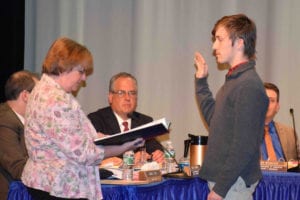
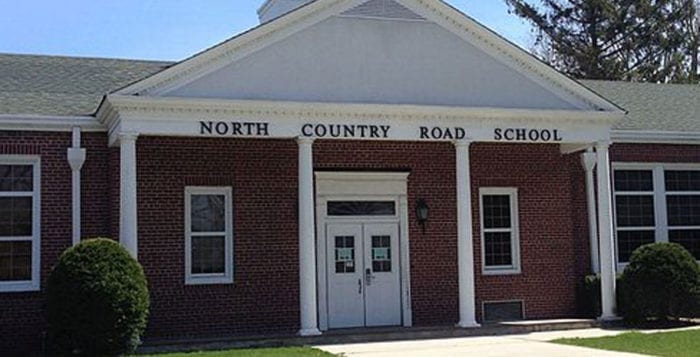



 “I believe my experience on the board over the last three years has affirmed that given my background in accounting and law … I have the technical skills and experience to help the [board] address many of the issues it faces today,” he said in his candidate statement.
“I believe my experience on the board over the last three years has affirmed that given my background in accounting and law … I have the technical skills and experience to help the [board] address many of the issues it faces today,” he said in his candidate statement. Cardinale has volunteered for several district committees, including the facilities and legislative committees.
Cardinale has volunteered for several district committees, including the facilities and legislative committees. Andrade is a Kings Park graduate and recently worked as a diversity advisor and surrogate for then candidate Donald Trump. He has been a television contributor for multiple news stations. He said he also volunteers for various Smithtown groups.
Andrade is a Kings Park graduate and recently worked as a diversity advisor and surrogate for then candidate Donald Trump. He has been a television contributor for multiple news stations. He said he also volunteers for various Smithtown groups. “I’d like to continue with the board, providing a financially responsible budget,” Waldron said in a phone interview. She also said she’s in support of many of the programs being expanded at the district now, including AP Capstone seminars and other educational opportunities for students.
“I’d like to continue with the board, providing a financially responsible budget,” Waldron said in a phone interview. She also said she’s in support of many of the programs being expanded at the district now, including AP Capstone seminars and other educational opportunities for students. “Serving on the Smithtown Board of Education gives me a sense of pride,” she said in an email. “I love the place that I have called home for over five decades and in particular, I love our schools.”
“Serving on the Smithtown Board of Education gives me a sense of pride,” she said in an email. “I love the place that I have called home for over five decades and in particular, I love our schools.” Plourde said simply why she’s running again.
Plourde said simply why she’s running again.
 Chris Kelly is running for a third-time, hoping to finally secure a seat. Kelly has been working in the market data business for the past 19 years, and said he wants to bring his professional skills to add something “unique” to the board.
Chris Kelly is running for a third-time, hoping to finally secure a seat. Kelly has been working in the market data business for the past 19 years, and said he wants to bring his professional skills to add something “unique” to the board. Anila Nitekman said she moved from Manhattan to Greenlawn because of the strong reputation the district had.
Anila Nitekman said she moved from Manhattan to Greenlawn because of the strong reputation the district had. Steinberg said he is eager to continue the work of the board, which he said has been very successful lately, including the creation of a new technology initiative.
Steinberg said he is eager to continue the work of the board, which he said has been very successful lately, including the creation of a new technology initiative. Lauri Levenberg has been a district resident for more than 20 years, and said she has the insight to help lead the school in a positive way.
Lauri Levenberg has been a district resident for more than 20 years, and said she has the insight to help lead the school in a positive way. “I still have a passion for it,” she said in a phone interview. “We should be taking enthusiastic 5-year-olds and making them into
“I still have a passion for it,” she said in a phone interview. “We should be taking enthusiastic 5-year-olds and making them into Loughran said he started attending school board meetings in February when the board was able to approve the nearly $40 million bond.
Loughran said he started attending school board meetings in February when the board was able to approve the nearly $40 million bond. A Long Island native, Herbert worked as a public school kindergarten teacher in Massachusetts for several years and is currently the director of the pre-school program at St. John’s Nursery School in Huntington village.
A Long Island native, Herbert worked as a public school kindergarten teacher in Massachusetts for several years and is currently the director of the pre-school program at St. John’s Nursery School in Huntington village.  In 2008, Palacios purchased and renovated a distressed property in Huntington Station where he established a satellite law office along with a community revitalization non-profit organization.
In 2008, Palacios purchased and renovated a distressed property in Huntington Station where he established a satellite law office along with a community revitalization non-profit organization.
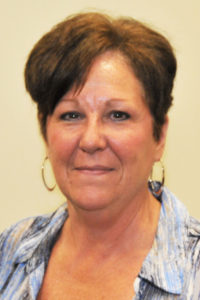
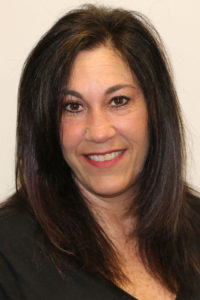





 Robert Sweeney
Robert Sweeney Edward Law
Edward Law Peter Van Middelem
Peter Van Middelem Michael McGuire
Michael McGuire


